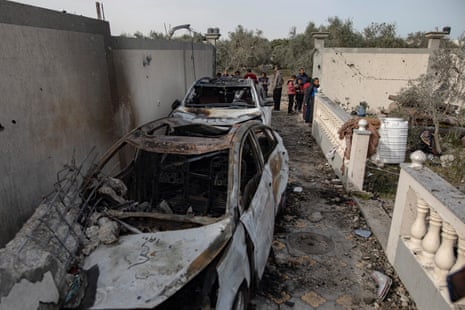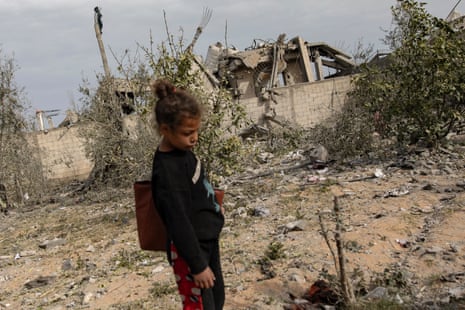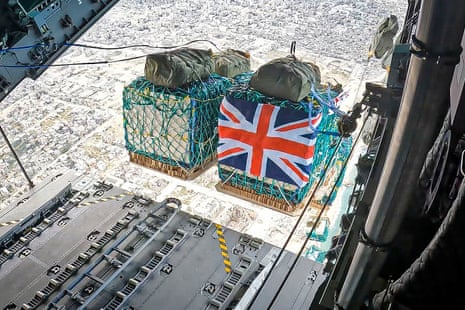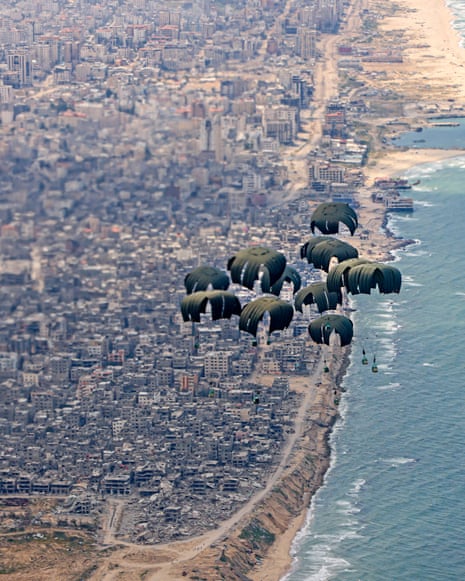Israeli delegation has left Qatar, ending ceasefire talks – reports
Israeli media is reporting that the Israeli delegation has left Qatar, ending talks to try and reach a ceasefire and hostage release deal.
More details soon …
Netanyahu’s office said ‘Israel will not cave to Hamas’s delusional demands’, ending immediate attempts to negotiate a ceasefire and hostage release deal

Israeli media is reporting that the Israeli delegation has left Qatar, ending talks to try and reach a ceasefire and hostage release deal.
More details soon …
Here are some of the latest images sent to us over the news wires from Gaza, as Israel continues airstrikes on the besieged territory.




Hind Khoudary, reporting for Al Jazeera from al-Aqsa hospital in Deir al-Balah in central Gaza says there are continued Israeli attacks. She writes:
The hospital is packed with wounded people after Israeli forces targeted a house in Zawaida in central Gaza. We see women, we see children wounded. Eyewitnesses tell us that children and babies were killed in the attack. After the UN resolution passed, Palestinians thought that they won’t be bombed in the Gaza Strip. But still, Palestinians continue to be killed and wounded.
Overnight the UK’s Ministry of Defence issued some photographs of its aid drop over the Gaza Strip. Aid cannot be delivered directly by air to Gaza as Israel destroyed the territory’s airstrip in 2004.


In its latest operational briefing, Israel’s military has said it continues its action inside Khan Younis and at the al-Shifa hospital, which it describes as “precise operational activity”.
It says that in the last day:
IAF fighter jets struck over 60 terror targets in the Gaza Strip, including terror tunnels, terrorist infrastructure, and military structures in which armed terrorists were identified. Terror targets in the area from which the launches were fired toward the city of Sderot were struck overnight.
It claims to be carrying out “targeted raids on buildings used by the Hamas terrorist organisation” and says that it “located AK-47s, military uniforms, cartridges, and military documents,” issuing some handout photos to the media of weapons it claims to have retrieved.
The claims have not been independently verified.
Hamas leader Ismail Haniyeh will travel to Tehran on Tuesday to meet Iranian officials, Reuters reports, citing Iran’s official Press TV.
It will be the Qatar-based leader’s second trip to Iran since the 7 October attacks.
Yesterday, Iran’s foreign ministry spokesperson Nasser Kanaani called the UN security council resolution calling for a ceasefire in Gaza a “positive step”, adding that “a more important step is effective action for its implementation.”
Lorenzo Tondo and Quique Kierszenbaum in Jerusalem have the latest on what has been a simmering row in Israeli politics:
A proposed bill to extend compulsory military service to ultra-Orthodox students, historically exempt from conscription, has ignited a fierce debate in Israel, with Benjamin Netanyahu reportedly warning that failure to pass the law could jeopardise the stability of the government.
Israel has mandatory army service but for decades made an exemption for ultra-Orthodox Jews, also known as Haredi, who are allowed to continue full-time Torah study. The proposal, as Israel approaches six months since the 7 October Hamas attacks that began the war in Gaza, seeks to extend the duration of military service for conscripts and raise the age for reservists, while also urging an end to the customary exemptions granted to yeshiva students.
It envisages ultra-Orthodox battalions in the Israel Defense Forces but does not set an annual quota for the enlistment of Haredi men.
The law, which will be discussed by ministers on Tuesday, has ignited a contentious debate in Israel. The prime minister has informed ministers in his Likud party that he is standing firm while Benny Gantz, a political rival of Netanyahu, has declared his willingness to resign from the emergency unity government if the law is approved, calling it a political compromise rather than a conscription solution for all society.
“The people will not tolerate it and my associates and I cannot be part of this emergency government if this law passes,” he said. “Passing such a law would be crossing a red line during normal times, and during the war it’s like flying a black flag over it. We will not be able to look in the eyes of fighters within our borders and beyond them, and ask them to extend their service.”
The defence minister, Yoav Gallant, also said he would not support the law, declaring he “will not be a party to any proposal that isn’t agreed upon by all coalition factions”.
Read more here: Plan to end ultra-Orthodox students’ military exemption sparks row in Israel
The UN Security Council’s approval of a resolution calling for an immediate end to hostilities emboldened Hamas to reject the latest ceasefire proposal, Israel’s foreign minister said Tuesday.
Late on Monday evening Hamas issued a statement rejecting the latest deal offer, saying Israel was not responding to its core demands of a “comprehensive ceasefire, an withdrawal from the Strip, the return of displaced people and a real prisoner exchange.”
Associated Press reports Israel Katz told Israeli Army Radio that the UN resolution indicated to Hamas that international pressure was closing in on Israel and that it need only wait for the war to end through that pressure rather than agreeing to make any concessions.
“The message delivered to Hamas yesterday is that you don’t have to hurry,” Katz said.
In further signs of a breach in the relationship between Israel and its most vocal ally, Katz also criticised the US for not vetoing the resolution. Katz pointed out that the agreed text did not condem Hamas.
At the UN security meeting in New York yesterday, the US ambassador to the UN, Linda Thomas-Greenfield, specifically criticised the resolution and the council as a whole for its failure to condemn Hamas, and said the US did not agree with everything in the resolution, hence it was not able to vote for it. But unlike several previous occasions when ceasefire resolutions have been debated, the US did not exercise its veto.
The resolution that passed on Monday demanded an immediate ceasefire for the month of Ramadan, and also demanded the release of hostages by Hamas. Crucially, as far as Israel is concerned, as well as not explicitly condemning Hamas for the 7 October attack, it did not make the ceasefire dependent on hostage release.
A repeated sticking point in ceasefire negotiations is reported to be a Hamas demand that Israel withdraw from Gaza militarily during the ceasefire. During the earlier pause in fighting in the war that allowed some hostage releases last year, Israeli troops stayed in position on the ground in the territory, but the two sides did not engage.
Israeli prime minister Benjamin Netanyahu has previously rejected Hamas’ demands, calling them “delusional”. After the UN vote, Netanyahu’s offce cancelled a planned visit to Washington by two of his ministers, which had been intended to discuss a planned Israeli offensive on Rafah. The US is pushing for Israel to make an alternative plan.
Israel believes that about 134 hostages are still being held in Gaza by Hamas and other groups after being abducted from inside southern Israel on 7 October. Not all of the captives are believed to still be alive.
In an operational briefing, Israel’s military has said that overnight it struck at what it described as “a Hezbollah military structure” inside Lebanon. It also reports that overnight “two launches were identified from Lebanon toward the area of Shlomi in northern Israel” and that it struck at the sources of the launches.
The claims have not been independently verified.
It has just gone 9am in Gaza and Tel Aviv, hello and welcome to the latest live blog on the Israel-Gaza war and the wider Middle East crisis. I am Martin Belam and I will be with you for the next while.
Israel has cancelled a visit to Washington by a high-level delegation that was due to discuss a planned Israeli offensive on the southernmost city of Rafah in Gaza, which the US opposes.
The visit was scrapped in the wake of a UN security council vote in favour of a ceasefire.
The US abstained from the vote, allowing it to pass. Israeli prime minister Benjamin Netanyahu accused the US of “retreating” from a “principled position” by allowing the vote to pass without conditioning the ceasefire on the release of hostages held by Hamas. White House national security spokesperson John Kirby responded by saying the administration was “kind of perplexed” by Netanyahu’s decision.
More on that in a moment but first, here’s a summary of the latest developments:
The UN security council voted to demand an immediate ceasefire in Gaza for the first time since the start of the Israel-Hamas war, after the US dropped a threat to veto, in a significant break with the Israeli government, bringing it to near total isolation on the world stage. The US abstained in a vote in Monday’s security council resolution demanding an immediate ceasefire for the month of Ramadan”. It also demanded the release of hostages by Hamas, but did not make the ceasefire dependent on hostage release, a linkage the US had previously insisted on.
Hamas welcomed the resolution and said it stood ready for an immediate exchange of prisoners with Israel, raising hopes of a breakthrough in negotiations taking place in Doha, where intelligence chiefs and other officials from the US, Egypt and Qatar are seeking to broker a deal that would involve the release of some hostages held by Hamas for Palestinian detainees and prisoners, and a truce that would last an initial six weeks.
After the UN vote, the office of Israeli prime minister Benjamin Netanyahu cancelled a planned visit to Washington by two of his ministers, intended to discuss a planned Israeli offensive on Rafah, which the US opposes. The White House said it was “very disappointed” by the decision. Israeli war cabinet minister Benny Gantz argued that the visit should go ahead.
Defense secretary, Lloyd Austin, is still expected to meet with Israel’s minister of defense Yoav Gallant on Tuesday to discuss ways to defeat Hamas other than conducting a ground invasion of the southern Gaza city of Rafah, according to the Pentagon.
Israel’s defence minister, Yoav Gallant, has already met with US secretary of state, Antony Blinken, who underscored in the meeting that alternatives exist to a ground invasion of Rafah that would both better ensure Israel’s security and protect Palestinian civilians, the state department said.
Hamas leader Ismail Haniyeh will travel to Tehran on Tuesday to meet Iranian officials, Iran’s official Press TV reported.
Britain’s Royal Air Force says it has airdropped more than 10 metric tons of food supplies into Gaza for the first time on Monday, Britain’s defence ministry said in a statement on Tuesday. “The aid, which consists of water, rice, cooking oil, flour, tinned goods and baby formula, will support the people of Gaza,” the ministry said. Aid cannot be delivered directly by air to Gaza as Israel destroyed the territory’s airstrip in 2004.
At least 32,333 Palestinians have been killed and 74,694 injured in Israel’s military offensive on Gaza since 7 October, the Gaza health ministry said on Monday.
Israel confirmed it will cease working with the UN agency for Palestinian refugees (Unrwa), accusing the organisation of “perpetuating the conflict”. Unrwa has provided essential services to the Palestinians in the occupied territories for decades, and has been at the centre of a bitter controversy after being accused by Israel of collaborating with Hamas in Gaza – a charge it has denied.
The medical situation in Gaza’s hospitals has reached an “unimaginable” state of crisis, according to an emergency medical team organised by three aid groups that spent two weeks carrying out surgeries and other care at the European hospital near Khan Younis.